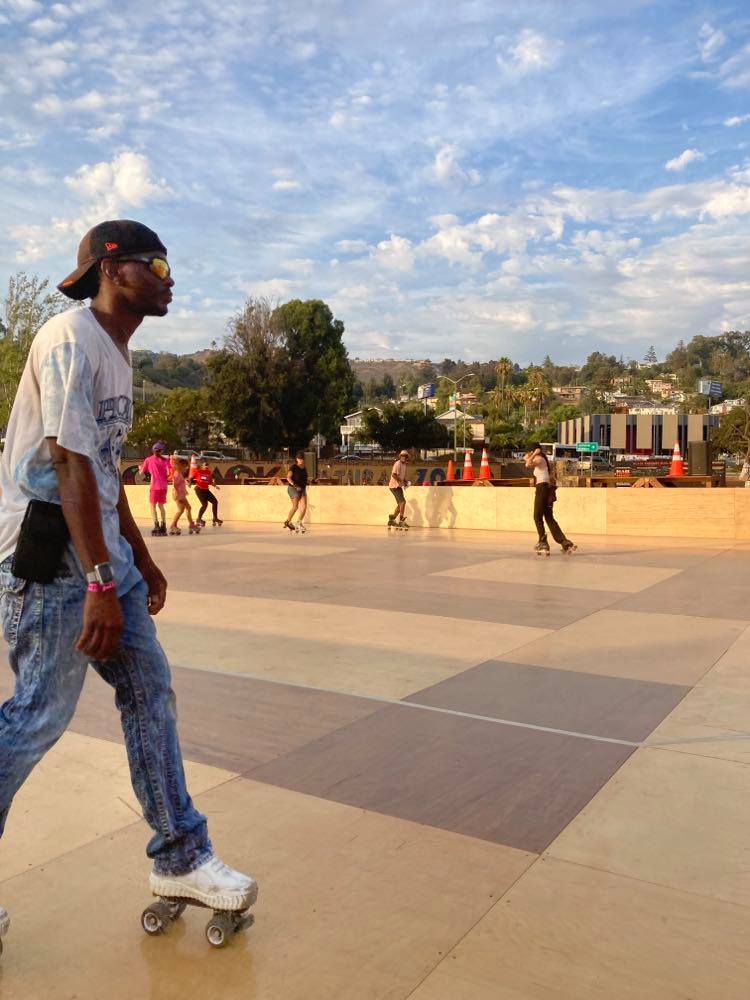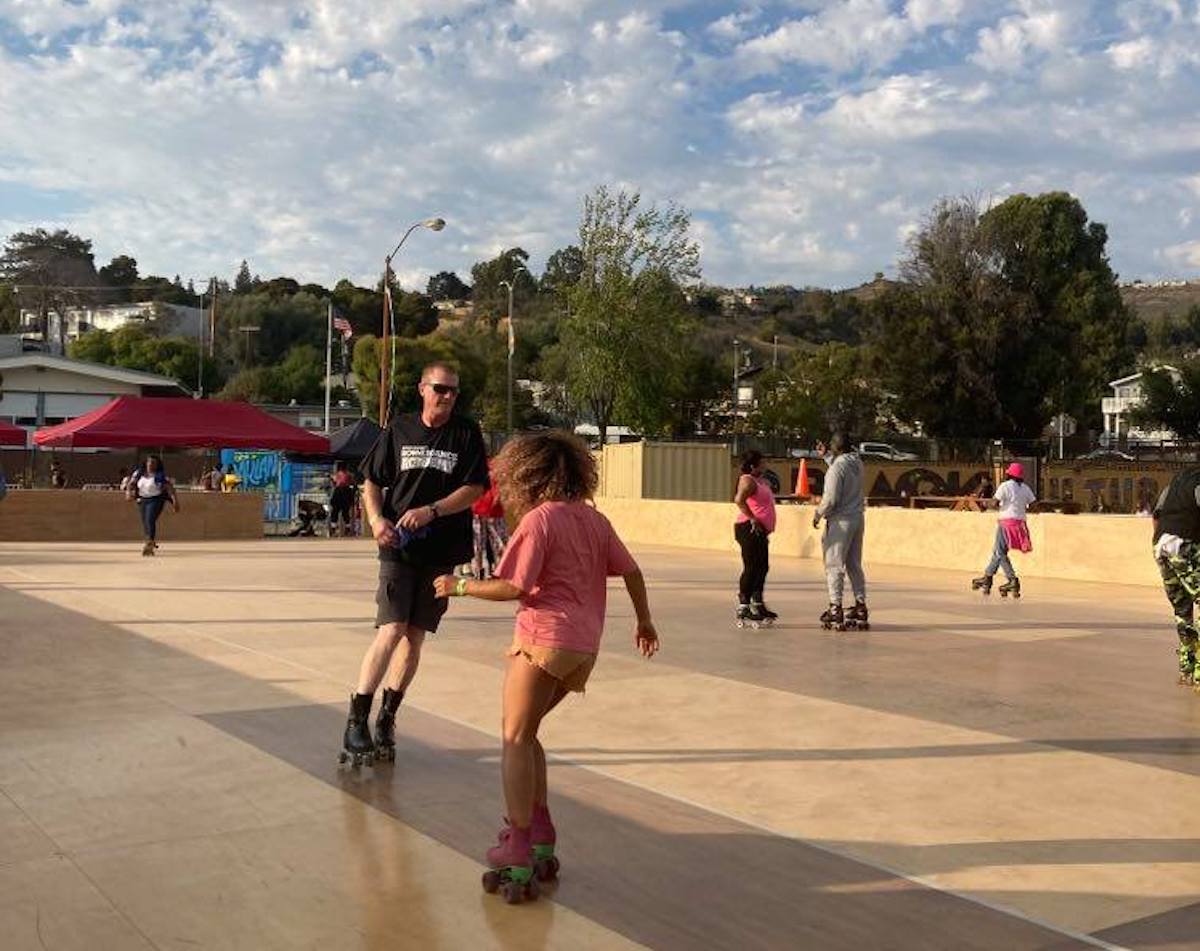Sitting on a once-vacant lot near Eastmont Mall, the newly opened UMOJA Outdoor Roller Skating Rink at Liberation Park rings alive with the hum of quad skates and the deep bass of funk music.
“The skating community has a specific music that they like,” said Carolyn Johnson, CEO of the Black Cultural Zone and the driving force behind the rink’s creation. “Still getting used to that.”
First opened last Juneteenth (June 19), the project is a joint effort of the Black Cultural Zone, the East Oakland community development organization that founded and manages Liberation Park, and David Miles Jr., the owner of San Francisco’s Church of 8 Wheels, also known as the Bay Area’s “Godfather of Skate.”
At a time when skaters of all stripes are calling on the city to create more spaces for them to roll, the UMOJA rink is the only skate rink currently operating in Oakland.
“I think this should be in every city,” said Miles. “I want to spread skating everywhere I possibly can. You don’t have to have a big-money partnership. You’ve got to let people know what you want and you have to do more than make noise.”
Before bringing the project to Liberation Park, a one-plus acre space tucked between Foothill Boulevard and 73rd Avenue in East Oakland, Miles was looking to establish a rink at Lake Merritt near the Edoff Memorial Bandstand. But after reaching out to multiple city officials, he was put in touch with Johnson at the Black Cultural Zone, and the idea of the UMOJA rink was born.
Although the rink is currently open every first, third, and fourth Sunday, it remains a work in progress. Lights, an overhead shade-covering, the formation of skate patrols (to assist the public and keep skaters safe in the rink), and skate instructors are just a few of the features that Miles and Johnson hope to add.
The Oaklandside recently visited the UMOJA rink on one particularly hot and sticky Sunday, and everyone present appeared to be feeling the vibes.

Songs by Drake, Beyonce, and local legends like Too $hort and E-40 boomed from a sound system being controlled by a live DJ. Everything from simple two-steps and handclaps to four-wheeled interpretive dance moves were on display inside the rink. One dancer, clad in all pink, fell, got back up with a grin, and left a six-foot sweat-angel as evidence of their effort.
“It’s more soulful here,” said one skater familiar with some of the other skate parties that have grown in popularity recently in Oakland.
For Johnson and the Black Cultural Zone, the UMOJA rink and Liberation Park—a multi-use community space—are about more than providing opportunities for physical recreation. They’re about rejuvenating the neighborhood while keeping its cultural identity intact.
“[In Eastmont] we don’t have a lot of Black vendors. We have no opportunities to earn income in the areas that we live,” said Johnson. “Family businesses might hire a few family members or a couple employees, but if your family doesn’t own businesses how can you thrive?”
The rink’s name, UMOJA, means “unity” in Swahili and pays tribute to the first principle of Kwanzaa, which stresses the importance of familial and communal togetherness.
Money for the rink’s construction was raised by the Black Cultural Zone and Miles, with plans to raise additional revenue from ticket sales ($10 a ticket for adult skate) and private events. Johnson said she hopes to also secure dedicated funding for the rink from the city of Oakland.
Johnson believes the UMOJA rink has the potential to shine a much-needed spotlight on Eastmont, and help to jumpstart other business and cultural activities that can stem the displacement of Black people from the neighborhood. Oakland and San Francisco recently topped a list of the “most intensely gentrified” U.S. cities in a study conducted by the National Community Reinvestment Coalition.
In addition to the skating rink, Liberation Park hosts the weekly Akoma Outdoor Market that prioritizes Black vendors and farmers, as well as a monthly movie night. A family skate session runs concurrently with the Akoma market on Sundays from 10 to 3 p.m., while an adult skating session runs from 4 to 7 p.m. and features food trucks and a drink stand.
Miles, who over the years has helped build portable skate rinks in other parts of the Bay Area and beyond, said he’s proud to be involved in “building something that people want, something that people need, something that will enhance the community.”
“I think that this is an example of how the community will be uplifted by skating,” said Miles, adding that he plans to continue working with the Black Cultural Zone on building a positive and community-minded skate culture around the rink.
One way to understand the importance of the UMOJA rink for the surrounding area, said Johnson, is to consider the history of the nearby Eastmont Mall.
In the 1960s, before the mall became a half-empty shopping center, it housed national retailers such as JCPenney, Woolworth’s, and Safeway. But as well-paying working-class jobs left East Oakland and the neighborhood’s fortunes fell, retailers gradually left the neighborhood. Now, instead of shoe stores or movie theaters, a social security office and an OPD substation are some of the commercial center’s main occupants.
“The bare necessities are all we have,” said Johnson.
The Eastmont police station, added Johnson, is not coincidental. She noted the legacy of the crack-cocaine epidemic and its long-lasting effect on Eastmont and East Oakland.
“The presence of addiction—it affected everyone in the community and everybody was touched by it,” she said.
For now, said Johnson, Liberation Park and the UMOJA rink are a beginning. Many commercial spaces in Eastmont remain vacant, and the Black Cultural Zone has goals to do more. When asked about her ideal Eastmont, Johnson was quick to respond.
“A thriving local community that has groceries, clothes, and food from the people who live in the same community,” said Johnson. “Visitors are attracted to the area for its arts and cultures. No violence, no murder. People are too busy living their lives. I see green space. I see languages and culture thriving. El Salvadoran, Guatemalan, Jamaican, everyone.”
In the meantime, the skaters skate on. Couples concentrate on coordinated dance moves, while first- or second-timers travel close to the wall for support and take pictures to prove that they, as well as the park, are there.
“The biggest strategy we have is hope,” said Johnson. “Once people start believing anything is possible, that’s when anything is possible.”
The UMOJA Skate Rink is located at Liberation Park at 7101 Foothill Boulevard and 73rd Avenue in Oakland. More information about rink hours and pricing can be found on the Black Cultural Zone website.

